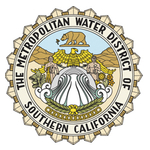New Southern California Water Bank Improves Water Supply Reliability for Millions
Officials celebrate start of $211 million High Desert Water Bank, Metropolitan’s largest-ever investment in groundwater storage
LANCASTER, Calif.–(BUSINESS WIRE)–After three years of construction, the first stage of a critical new groundwater storage project is complete and water is flowing into storage, significantly increasing Southern California’s water supply reliability in the face of a rapidly changing climate. Officials from the Metropolitan Water District of Southern California and the Antelope Valley-East Kern Water Agency celebrated the key milestone today.
The High Desert Water Bank, a partnership between the two agencies, allows Metropolitan to store State Water Project supplies in the Antelope Valley groundwater basin. At 280,000 acre-feet, the water bank’s capacity is comparable in size to Castaic Lake, nearly double the size of Lake Perris and four times the capacity of Big Bear Lake.
“This investment makes all our communities better prepared for the weather extremes that we increasingly confront,” Metropolitan board Chair Adán Ortega, Jr. said. “We know that climate change will bring more of the dramatic swings between wet and dry that we saw over the last few years, so we must take every opportunity to store water when it is available. The great news is, we completed this work in time to take advantage of this historically wet year.”
The water bank not only significantly increases Metropolitan’s total storage capacity along the State Water Project, the project’s size and scale allows Metropolitan to annually store and withdraw up to 70,000 acre-feet of water – enough to serve the annual needs of 210,000 Southern California homes.
The newly built infrastructure allows water managers to take water directly from the East Branch of the SWP’s California Aqueduct and move it into recharge basins, where it percolates into the underlying aquifer. When needed, water can be pumped back out using newly built wells and delivered to Southern California communities through the California Aqueduct.
“The ability to access 70,000 acre-feet of stored water a year south of the Tehachapi mountains, is what sets this project apart,” said AVEK General Manager Matthew Knudson. “We have designed this project to ensure it provides maximum benefit to the communities of Southern California. This water will be available during extreme droughts or emergencies, when there is limited other water available through the State Water Project.”
The water bank will also help Southern California reduce its reliance on the Colorado River, which faces a structural imbalance and requires significant cutbacks by all river users, explained Metropolitan General Manager Adel Hagekhalil.
“When drought hits California, we can turn to this stored water, instead of drawing more heavily on our Colorado River supplies,” Hagekhalil said.
“As we ask Southern Californians to become more efficient in their water use, Metropolitan is also making big investments to adapt to future stresses on our water supplies,” Hagekhalil continued. “This project is just the beginning. We have launched a process called the Climate Adaptation Master Plan for Water, through which we will determine the types of additional investments necessary to ensure water supply reliability in a changing climate.”
The partnership between Metropolitan and AVEK to build the High Desert Water Bank began in 2019. Metropolitan is funding the $211 million construction of the project on AVEK property, which was formerly farmland and vacant land. To date, AVEK has completed the construction of the stage 1 recharge basins, which are approximately 40 percent of the total recharge area; 10 recovery wells; five monitoring wells; and the turn-in/turn-out facilities from the California Aqueduct. AVEK is currently building the stage 2 recharge basins and over the next couple of years will construct 17 additional recovery wells for a total of 27 wells and an arsenic treatment facility. The project will be fully operational in 2027.
“This is a shining example of a multi-benefit project that is good for AVEK and Metropolitan customers, the Antelope Valley, and all of Southern California,” said AVEK Board President George Lane. “We hope this project showcases what is possible when two agencies commit to a shared goal of water sustainability.”
The Metropolitan Water District of Southern California is a state-established cooperative that, along with its 26 member agencies and retail suppliers, provide water for 19 million people in six counties. The district imports water from the Colorado River and Northern California to supplement local supplies, and helps its members to develop increased water conservation, recycling, storage and other resource-management programs.
Antelope Valley-East Kern Water Agency received its charter as a regional water Agency from the State Legislature in 1959. In 1962 AVEK’s Board of Directors signed a contract with the state to secure the delivery of water supplies intended to supplement the local groundwater. AVEK became the 3rd largest State Water Contractor with an entitlement of 144,844 acre-feet. Through the optimization of water resources and development of groundwater storage, the Agency maintains a reliable, sustainable, and affordable water supply. Serving over 20 municipal users along with Edwards Air Force Base, Plant 42, and U.S. Borax within a 2,400 square mile territory that includes portions Los Angeles, Kern and Ventura Counties, the agency plays a vital role in supporting future regional economic development and national defense programs.
Note to editors: b-roll of the High Desert Water Bank project is available here.
Contacts
Rebecca Kimitch, Metropolitan, (213) 217-6450; (202) 821-5253, mobile; rkimitch@mwdh2o.com
Maritza Fairfield, Metropolitan, (213) 217-6853; (909) 816-7722, mobile; mfairfield@mwdh2o.com
Pam Clark, AVEK, (661) 349-8166; (661) 600-6453, mobile; pclark@avek.org




